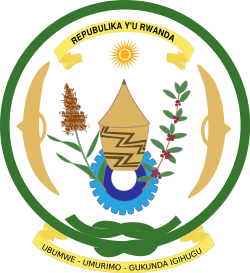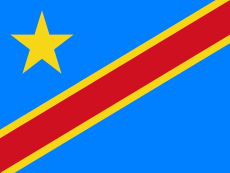Foreign relations of Rwanda
 |
| This article is part of a series on the politics and government of Rwanda |
|
Government |
|
Judiciary |
|
United Nations in Rwanda |
Rwanda has been the center of much international attention since the war and genocide of 1994. The country is an active member of the United Nations, having presided over the Security Council during part of 1995 and again in 2013-2014. The UN assistance mission in Rwanda, a UN Chapter 6 peace-keeping operation, involved personnel from more than a dozen countries. Most of the UN development and humanitarian agencies have had a large presence in Rwanda.
During the height of the crisis, a three-month period in 1994, however, the UN removed most of its peacekeepers, and virtually all other formal foreign support fled as well. The only other nation to directly involve itself at that point was France. While the Rwandan Civil War was a complex sequence of violent episodes which included killers and victims on all sides, most historians agree with RPF's assertions that the 1994 genocide was a deliberate, methodical Hutu campaign to completely exterminate the Tutsis, and that plans for the genocide were well known in advance by European, American, and UN officials.[1][2]
While formal foreign assistance evaporated at the height of the emergency, more than 200 non-governmental organizations were carrying out humanitarian operations. Several west European and African nations, Canada, People's Republic of China, Egypt, Libya, Russia, the Holy See, and the European Union maintain diplomatic missions in Kigali.
Rwanda is a member of the United Nations, African Union, Commonwealth of Nations since November 2009; and the East African Community, which may become the East African Federation.
Bilateral relations
.svg.png) Belgium
Belgium
 Burundi
Burundi
Burundi and Rwanda dispute sections of border on the Akanyaru and the Kagera/Nyabarongo rivers, which have changed course since the 1960s, when the boundary was delimited; cross-border conflicts among Tutsi, Hutu, other ethnic groups, associated political rebels, armed gangs, and various government forces persist in the Great Lakes region.
 China
China
China and Rwanda established diplomatic relations on November 12, 1971.[5]
 Democratic Republic of the Congo
Democratic Republic of the Congo
In 1998, Rwanda, along with Uganda, invaded the Democratic Republic of the Congo to back Congolese rebels trying to overthrow then-President Laurent Kabila. Rwandan troops remain in the Congo, backing rebels that aim to overthrow Laurent Kabila’s son, Joseph Kabila, who is now the President of the Congo. Rwandan troops have pulled back, however, behind disengagement lines set forth in the Lusaka Ceasefire Agreement.
Rwandan President Paul Kagame met with the Democratic Republic of the Congo's President Joseph Kabila in Goma on 6 August 2009.[6] It was the first presidential meeting between the two countries for 13 years,[7] with the two countries having come to a disagreement in 1996 following an invasion by Rwanda into eastern Congo, a disagreement which was renewed in 1998 after a further invasion.[6] The pair of presidents spent more than two hours in the company of each other and "reviewed all issues of common interest".[6] Kabila referred to it as "the first giant step forward" in what was referred to as an "all new era".[7] One month previous to the meeting both countries had appointed ambassadors to each other's capitals.[6][7]
 France
France
As a result of alleged French complicity with the genocidaires, Rwanda cut off relations with France at the end of the war, and replaced French with English as an official language. Relations were resumed in November 2009 . Nicolas Sarkozy visited Kigali in February 2010.[8]
 India
India
- India is represented in Rwanda through its High Commission in Kigali.[9]
- Rwanda has its Embassy in New Delhi.[10]
 South Korea
South Korea
Establishment of Diplomatic Relations between the Republic of Korea (South Korea) and the Republic of Rwanda is March 21, 1963.[11]
 United States
United States

U.S. Government interests have shifted significantly since the 1994 genocide from a strictly humanitarian concern focusing on stability and security to a strong partnership with the Government of Rwanda focusing on sustainable development. The largest U.S. Government programs are the President's Emergency Plan for AIDS Relief (PEPFAR) and the President's Malaria Initiative, which aim to reduce the impact of these debilitating diseases in Rwanda. Other activities promote rural economic growth and support good governance and decentralization. Overall U.S. foreign assistance to Rwanda has increased fourfold over the past four years.
![]() This article incorporates public domain material from the United States Department of State website http://www.state.gov/r/pa/ei/bgn/index.htm (Background Notes).[12]
This article incorporates public domain material from the United States Department of State website http://www.state.gov/r/pa/ei/bgn/index.htm (Background Notes).[12]
See also
References
- ↑ Doyle, Mark (May–June 2006). "Rewriting Rwanda". Foreign Policy (154). Retrieved 9 April 2007.
- ↑ Gourevitch, Philip (1999). We Wish to Inform You That Tomorrow We Will be Killed With our Families. Picador. ISBN 0-312-24335-9.
- ↑ Embassy of Belgium in Kigali (in Dutch, English and French)
- ↑ Embassy of Rwanda in Brussels (in French)
- ↑ http://www.china.org.cn/english/features/focac/183428.htm
- 1 2 3 4 "Kagame and Kabila restore ties". IOL. 7 August 2009. Retrieved 10 August 2009.
- 1 2 3 "'New era' for DR Congo and Rwanda". BBC. 6 August 2009. Retrieved 10 August 2009.
- ↑ "On Visit to Rwanda, Sarkozy Admits ‘Grave Errors’ in 1994 Genocide". February 25, 2010. New York Times.
- ↑ Indian High Commission in Rwanda
- ↑ Rwanda Embassy in India
- ↑ http://www.mofa.go.kr/ENG/countries/middleeast/countries/20070824/1_24449.jsp?menu=m_30_50
- ↑ http://www.state.gov/r/pa/ei/bgn/2861.htm